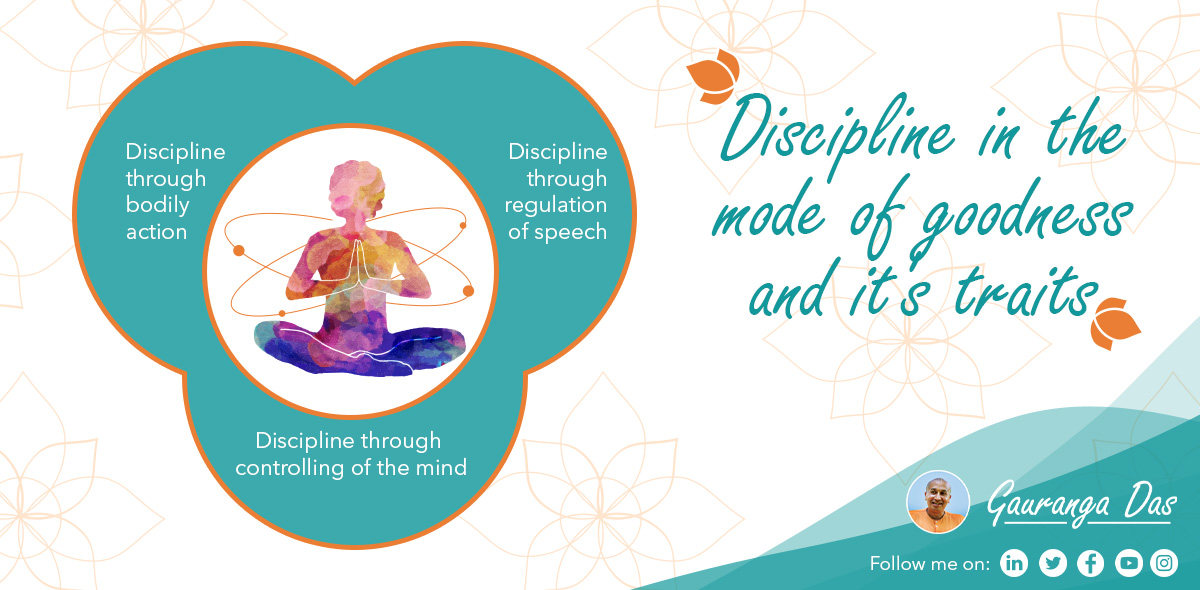Time waits for none. It is a fact that all of us are bound by time. Nobody can imagine running their lives without it, and can neither function systematically without it. Moreover, time can only be spent. To efficiently spend it, we build our own effective disciplinary regimes. Yet, at times discipline burns us out, drives us crazy, and sometimes takes us further away from our intended goals. Lord Krishna in Bhagavad Gita details on the three types of discipline humans tends to follow depending on the combinations of modes of material nature involved.
Briefly, Discipline in the mode of ignorance is born out of the wrong intentions to harm oneself and others, and dominated by foolishness and ill motives. Whereas, discipline in the mode of passion is also rigorously practised yet the driving factor is to acquire fame and power. The purpose of anyone following certain self-restraint activities is to seek honour and satisfy their pride. There is a third type of discipline, that which is practised at the right time for the right reason. This usually is done for a higher purpose and for the welfare of self and others. It is referred to in Gita as a discipline in the mode of goodness.
This propels us to question the components of discipline in the mode of goodness. Discipline is expressed through one’s body, speech and mind.
- Discipline through bodily action– Austerity performed in goodness through one’s body involves five components of consideration.
deva-dvija-guru-prājña-
pūjanam śaucam ārjavam
brahmacaryam ahimsā ca
śārīram tapa ucyate
Worship – Pūjanam
One who aims to regulate their behaviour initially uses his body to worship and respect The Supreme Lord, the Brahmanas, one’s spiritual master, and his superiors like father and mother. Here worship refers to following their instructions sincerely without considering one’s personal agendas. Because, when instructions are carried out, it indicates a deeper appreciation of worship.
Cleanliness – Śaucam
Cleanliness here is dealt with at various levels. First being yuktahara, eating proper satvic clean food, as ‘you become what you eat.’ Extravagant and unclean eating blocks one’s progress towards higher consciousness. Next is, viharasya overindulging in the recreation of any kind will force a person to constantly gratify his senses, and thus leading them to fall back into the material pool. Furthermore, Yukta svapnava bodasya 7 hours of sleep a day approximately consumes to 1/3rd of a person’s lifetime. Thus, maintaining the right amount of sleeping and having clean habits are highly critical in harnessing one’s consciousness.
Simplicity – ārjavam
Simplicity isn’t just a lifestyle, but it intends on having no duplicity in one’s dealings and behavior. Simplicity as a discipline expressed via one’s body is by simply following the instructions as it is instead of complicating or beating it around the bush.
Celibacy – brahmacaryam
Celibacy means to control one’s mind and senses and not be obsessed with thoughts of sex. This is one of the biggest problems in this world right now and is a very important aspect of the discipline. Especially, today’s youth are enthused constantly engaged in senses gratification and mainly sex life. This causes an unhealthy pattern in building valuable relationships. Abstaining from bodily gratification purifies one’s consciousness and revitalizes them to serve the greater good.
Non-violence – ahimsā
Nonviolence basically refers to not impeding the progress of anyone’s spiritual life. Although it is generally considered as not killing someone or something, non-violence mainly indicates not putting others in distress.
Srila Prabhupada writes in his Bhagavad Gita As It Is that, ‘people, in general, are trapped by ignorance in the material concept of life, and they perpetually suffer material pains. So, unless one elevates people to spiritual knowledge, one is practising violence.’
2. Discipline through regulation of speech: Disciplining one’s speech has five characteristics to train upon according to the verse:
anudvega-karam vakyam
satyam priya-hitam ca yat
svādhyāyābhyasanam caiva
vān-mayam tapa ucyate
Truthful – satyam
It is important to train the tongue to always speak truthful words. That truthfulness begins when one starts understanding the absolute truth, The Supreme Personality of Godhead. One’s spiritual life begins through the process of hearing. To speak the truth, one needs to hear truthful subjects revealing the glories of the Supreme Truth.
Pleasing – Priya
The truth spoken must be presented in a pleasing manner. It is often mentioned in scriptures that even while dealing with harsh men, Lord Krishna never spoke anything in an unpleasant way. He had expertise in submitting his truth in tender words even to his enemies.
Beneficial – hitam
Truth must not be merely pleasing, but also beneficial to the listeners. A devotee doesn’t consider what he is going through but always is eager to benefit others through his words, by spreading the message of Love of Godhead.
Not agitation – anudvega karam
The truth spoken shouldn’t be agitating anyone’s mind or disturb them in any way.
Based on scriptures – svādhyāyābhyasanam
Moreover, the truth must always be in accordance with what the Vedic scriptures reveal to us. Anything that is speculated or assumed based on experiential learning cannot be immediately accepted as truth and must be verified with the revealed sastras.
3. Discipline through controlling of the mind:
Disciplining the mind by controlling the flow of thoughts is the most difficult.
manaḥ-prasādaḥ saumyatvaṁ
maunam ātma-vinigrahaḥ
bhāva-saṁśuddhir ity etat
tapo mānasam
Satisfaction – mana prasādah:
By staying satisfied one can control the mind from giving into greedy desires. Satisfaction refers to no thoughts of sense gratification, because sense gratification can never be satiated, and only by feeling contentment in whatever God provides us on levels, one can restrain from thinking what to acquire next. The more one absorbs themselves in studying spiritual scriptures rather than newspapers and magazines filled with content that brings dissatisfaction to the heart and mind, it is easier to train the mind to stay satisfied.
Simplicity – saumyatvam:
As said before, simplicity means no duplicity in thoughts. Expressing what is inside on the outside transparently. Keeping thoughts as honest as possible without complicating them is vital.
Gravity – maunam
Srila Prabhupada notes gravity as constantly thinking about the goal of self-realization, how one can engage his senses in Krishna’s service, and how to completely focus the mind on these two primary aspects of their lives.
Self-control – ātma vinigrahah
Self-control denotes controlling one’s senses from running behind material gratification and redirecting them to engaging in Krishna’s service.
Purification of one’s existence – bhāva samśuddhir
Finally, purification of existence can take place through pure association. Being in contact with truth, and truthful people dedicating their lives in service of God purifies the body, mind, and speech. Especially for purifying the mind, one needs to be highly honest in his dealings with others.
Srila Prabhupada was once asked by his disciple that if he can go to preach Krishna Consciousness at a nearby nightclub that’s quite famous for attracting a bunch of crowds. Srila Prabhupada responded, ‘Make sure you come back. Senses are so wild you can’t take them for granted.’
So therefore these are very critical factors to consider while trying to discipline our body, mind, and speech. All of us are thinking constantly and if we could just apply this discipline in our mental activities of thinking, feeling, and being willing, life will transform for the better and consciousness will take pleasure in a higher purpose of life. This is the message of Bhagavad Gita on discipline.




